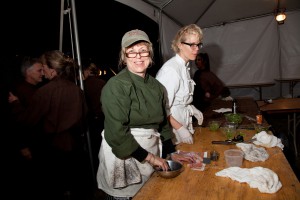Off-premise catering is hard work, especially weddings. Please don’t misunderstand, I love my work. I have done quite a few things in this life to bring me to the place where I work for myself, doing something I love; preparing beautiful food for life’s celebrations. There is nothing in the world like working with a couple to perfectly match food and presentation to their cultural heritages, personal tastes and aspirations for this special day. Often times, this means bringing the celebration to places where someone would not ordinarily go to enjoy a meal, which leads me to the point of this discussion. We, as caterers, recreate an incredible dining experience for each and every client, and we make it look easy.
The wedding industry is a multi-million dollar machine today. Just take a glance at all the glossy magazines, blogs and websites that provide inspiration to the newly engaged bride-to-be. Catering is just on piece in the puzzle of planning and executing the “perfect” wedding celebration. Some of the talented professionals that come together to create a wedding are wedding planners and coordinators, caterers, floral designers, musicians, artists, videographers, photographers, entertainers and bakers. Today’s bride must budget for all of these services in order to match the dream weddings as portrayed in the media. Each takes a slice of the pie both financially and emotionally.
Caterers are magicians and miracle workers at heart. We often find our way to the business through being exceptional hosts; planning and executing parties of our own that make our guests feel loved and indulged, as if every element of the event was planned for them alone. We must be creative, but intuitive, quietly figuring out exactly what would delight our guests and clients. When we execute large and complex events, no one sees what goes on behind the scenes, before, after and during the party itself, to allow this magic to manifest. We make it look easy.
One of my colleagues, Dine by Design, described what we do in a recent blog post (http://
Caterers, on the other hand, compete on a different playing field. Food, quite often good food, is something many people enjoy on a daily basis. They can prepare it at home, buy it to take out, enjoy it in a restaurant, or sample it at a party when prepared by family and friends. On the surface, it seems like a pretty simple proposition. I can’t say how many times, after presenting a menu that has taken hours to research and develop for a couple, I am confronted by the opinion that “…we could do this a lot cheaper ourselves.” When we sell a proposal, we offer tastes of our food, many times at no charge (which is another topic altogether), photographs of our food, and testimonials from others who have enjoyed our food. We neglect to sell our prospective clients on what is required in order to integrate this food into their wedding celebration. Perhaps we need to show before and after photographs of the “back of the house” at their wedding site. Or of the prep cooks scooping and forming the 800+ mini crab cakes their guests will enjoy from the service staff’s passing trays during cocktail hour. Heaven forbid we show them photographs of the towering racks of dishes and glassware in the dishwashing station, sorted and rinsed to go back to the rental company, long after the last guest has departed.
Instead, we sell them on the beautiful photos and video (if we are lucky enough to get them during the event) of the finished product. Perfectly garnished trays of passed appetizers, bountiful and inviting buffets, fun and exciting chef stations and exquisite plates dropped magically in front of each of their guests by a smiling server. It is no wonder we have difficulty “justifying” the cost of our services.
I am not advocating that we take away the magic. I am suggesting that we do a more complete job of telling the story of what we do. The only picture a prospective bride gets of a caterer is that reflected in the wedding media. Since we usually represent one of the largest pieces of the budget pie, a lot of column inches are devoted to getting the best value out of your caterer. We as an industry must do our part to explain the complex package of products and services we provide. Only in this way will our prospective clients really understand the value of what they are purchasing. This also means resisting the temptation to give away what we do for free. Whether it is setting a fee for tastings (usually applied to the total event cost if booked), refusing to provide a no-cost overage guarantee, avoiding adding in items and services as an incentive to book with us rather than our competition and truly assigning a value in our own minds for the magic we perform. If we don’t believe we are worth the money, how can we convince our clients?
Let’s be proud of what we do. A good magician is able to convey the complexity and difficulty of their performance without giving away their secrets. Today, I plan to challenge myself to tell the story of what I do in such a way that the prospective client is intrigued, curious and a little bit awed. To be sure, I will make it look amazing, fabulous and magical, but I will try not to make it look easy.



